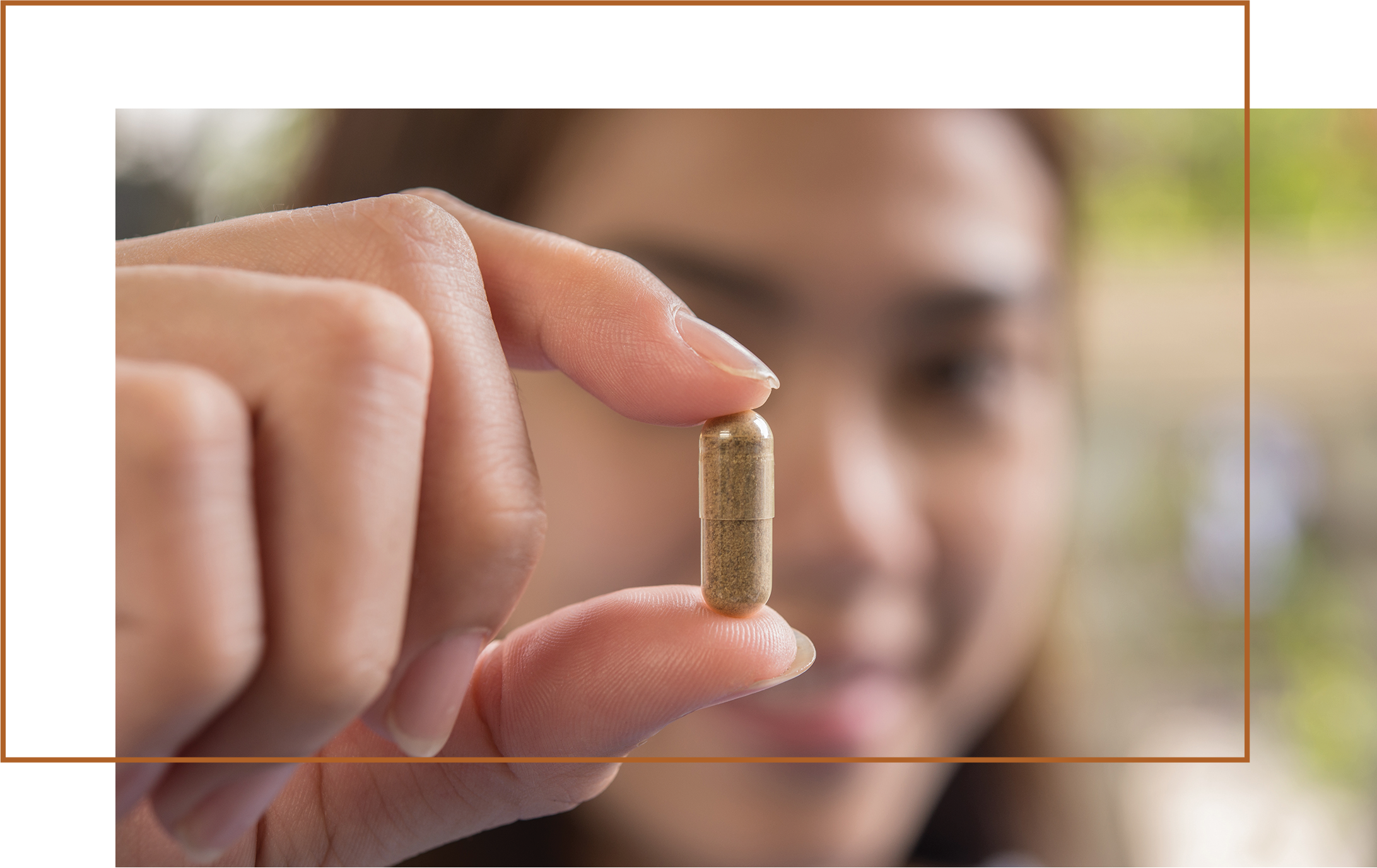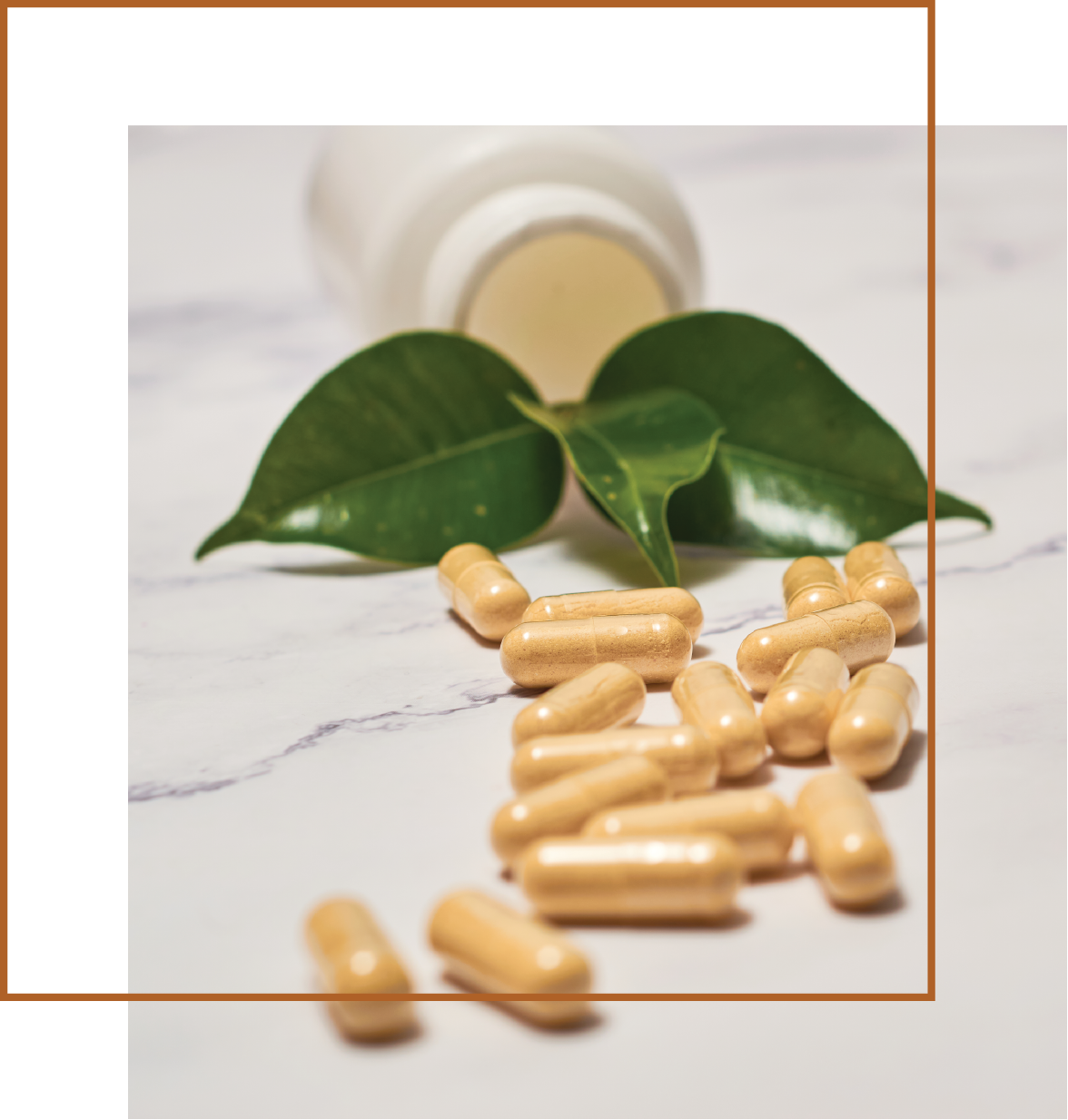Derma µBiomic
Skin Restoring Probiotic
A skin-nourishing probiotic containing Alimentum Labs’ patent-pending blend of unique probiotics that regulate immune function and promote healthy skin by supporting the gut-skin axis.
A skin-nourishing probiotic containing Alimentum Labs’ patent-pending blend of unique probiotics that regulate immune function and promote healthy skin by supporting the gut-skin axis.
Take 1-2 capsules daily for 30 days with or without food. Refrigerate after opening to optimize shelf life.
We recommend Derma μBiomic be paired with its synergistic topical formula, Derma Serum, for unparalleled results and remarkable skin health benefits.
**Individual needs may vary; please consult your practitioner before altering the prescribed doses or protocols.

In the midst of modern lifestyle challenges and environmental pollution, our skin faces constant stress. Derma μBiomic is crafted to address these concerns and enhance skin health by leveraging the intricate gut-skin axis.
In today’s world, where pollutants and daily stresses take a toll on our skin, this skin restoring probiotic offers a gentle, yet powerful approach. The gut-skin axis, a sophisticated system connecting the gastrointestinal microbiome and immune system to the skin, plays a pivotal role in skin health. Derma μBiomic acts as a bridge between inner and outer health, nourishing your gut microbiota and fortifying your skin’s immune system.

Ongoing research on skin microbiota highlights a clear link between microbial diversity and the resilience of our skin’s immune defenses. The surprising, yet intricate connection between the gastrointestinal immune system, gut microbiota, and skin health behavior, underscores the importance of this distant relationship – the gut-skin axis.
Derma μBiomic supplements specific probiotics that provide a myriad of benefits for your skin. Experience improvements in skin appearance as these probiotics work in harmony with your gut and skin’s immune cells. Our product is designed not only to enhance skin aesthetics but also to bolster overall immune function in the skin.
In the face of skin conditions exacerbated by our modern lifestyle, Derma μBiomic is your ally, offering a proactive solution. Elevate your skincare routine with the science-backed benefits of Derma μBiomic and embrace healthier, more resilient, and radiant skin that withstands the challenges of contemporary living.
Consumption of Derma μBiomic’s unique combination of probiotics partners with the body’s immune system to manage and alleviate symptoms of autoimmune-related skin conditions.
Reduces and manages acne by inhibiting the growth of pathogenic skin microbes, promoting the growth of a thriving skin microbiome, and curbing inflammation.
By using intrinsic pathways in the body, Derma μBiomic boosts hydration, supports cellular collagen and hyaluronic acid production, balances skin pH, and mitigates UV damage for visibly improved skin health.
Promotes a diverse and balanced microbiome throughout the whole body by starting in the gut; this helps repair the gut-skin axis for long-term benefits.
It may seem surprising that consuming probiotics can improve and nourish skin, however consumable probiotics target skin health in a unique way. While topical probiotics can be hugely beneficial by providing surface-level benefits, consumable probiotics work to repair, revitalize, and maintain skin health from the inside out, thanks to the underappreciated gut-skin axis.
Derma μBiomic is specifically formulated to include probiotic strains known to modulate the gut microbiome, interact with the immune system, and have demonstrated healing effects on the skin in clinical trials. These strains of probiotics reduce inflammation, promote healing, revitalize the skin, and inhibit pathogen growth in the gut and on the skin.
Years of scientific research have gone into the development of Derma μBiomic to create a product that supports and repairs problematic skin through the gut-skin axis. Through oral consumption, Derma μBiomic enables the probiotics to interact with immune cells in the gastrointestinal tract. These interactions educate and prime the immune system, allowing the immune system to respond appropriately to external invaders without overreacting to normal inhabitants and contact. When the immune system functions properly, the innate mechanics of skin repair, function, and health can reach their full potential.

B. licheniformis produces exopolysaccharides (EPSs) that have shown immunoregulatory, antimicrobial, antiviral, and antiparasitic effects.1 Most notably, it produces an antibacterial substance known as bacitracin, which is the active ingredient in the topical ointment used for minor skin injuries, named after this protective compound.2
P. freudenreichii is an important dairy fermenting strain, primarily in cheeses, where it contributes to the formation of the characteristic “eyes” in swiss cheese by producing carbon dioxide.3 It also produces numerous beneficial postbiotics, including propionic and acetic acid, B vitamins, all essential amino acids, and DHNA which increases the growth of beneficial Bifidobacteria and is a vitamin K2 intermediate.3–5 Studies have reported its ability to reduce the risk of eczema in infants.6
L. rhamnosus was shown to effectively treat atopic dermatitis and improve quality of life in a double-blind, clinical trial.7 It has also demonstrated its ability to prevent infection of human skin cells by Staphylococcus aureus by enhancing the body’s natural immune response and adjusting pH.8
B. lactis, also known as Bifidobacterium animalis ssp. lactis, was originally isolated from commercial dairy products and is now widely manufactured as a probiotic that produces beneficial lactic acid and acetate.9,10 When given in combination with prebiotics, it has the potential to reduce inflammation and increase levels of bifidobacterium in the gut.11 When given in combination with other probiotics to high risk infants, there was a 40% reduction in inflammatory factors and atopic dermatitis development.12
B. bifidum feeds primarily on sugars found in human breast milk, which allow it to colonize the intestine immediately after birth. Since it also has the ability to break down the mucin lining the intestine, it can persist in the gut into adulthood, albeit at lower levels.13,14 This probiotic strain produces beneficial postbiotics, including lactic acid, acetate, and vitamin B1.13,15,16 Studies have demonstrated its effectiveness in reducing skin inflammation associated with eczema, as well as reducing the occurrence of eczema in infants when given to pregnant mothers and then to newborn infants.17–20 Additionally, it has been found to eliminate symptoms related to milk allergy in infants.21
In a clinical trial, L. salivarius was shown to reduce acne lesions and inflammation. Additionally, it decreased the populations of bacteria that were pathogenic to the skin.22
L. fermentum produces lactic acid, acetic acid, cyclic dipeptides, and exopolysaccharides, all which play a role in its ability to inhibit pathogens like Candida and Staphylococcus aureus.23–27 It also produces nicotinamide, which helps reduce oxidative damage in cells exposed to UV light.28 L. fermentum has been found to inhibit melanin production, thereby addressing skin conditions and cancer risks associated with its overproduction.29 Additionally, it enhances skin hydration by increasing the production of hyaluronic acid, thereby improving its ability to protect the skin against damage and infection.27 Furthermore, L. fermentum supports skin health through educating the immune system and regulating normal inflammatory responses.30
L. paracasei has been shown to regulate the immune system after oral consumption, allowing it to support skin health from the inside out. In addition to inhibiting pathogen growth, it can also help prevent dryness and inflammation of the scalp.31
L. casei supports skin health through the gut-skin axis by reducing overall inflammation and flakiness. Protecting the skin barrier in this way also helps prevent issues such as infection, scarring, itchiness, and more.32
M. luteus produces a carotenoid pigment that filters long-wave UV radiation.33 Long wave UV filtering is a feature rarely included in sunscreen products. Therefore M. luteus has been included in proposals to produce sunscreens containing this pigment to enhance skin protection.34 Studies indicate that this probiotic has the potential to improve visual characteristics of the skin, as well as reduce the number of potentially pathogenic bacteria.33
L. lactis, also known as Lactococcus lactis ssp lactis, produces exopolysaccharides (EPSs), which have known immunomodulatory effects.39 When taken orally, it has been shown to decrease pathogenic Staphylococcus aureus colonization on the skin.40 Topical application has also been reported to improve skin hydration and enhance its ability to provide protection.41 Additionally, when combined with yellow LED light therapy, it synergistically healed burn wounds.42 Oral supplementation of L. lactis has also shown efficiency in improving eczema symptoms.43
When used as directed there are no known contraindications for Derma µBiomic.
**It is always recommended that you consult your practitioner prior to adding any new supplement to your regimen if you are pregnant, breastfeeding, experiencing renal failure, undergoing an organ transplant(s), managing diabetes with insulin, or are taking medication(s) for any pre-existing conditions.**
All ingredients are tested before use for: